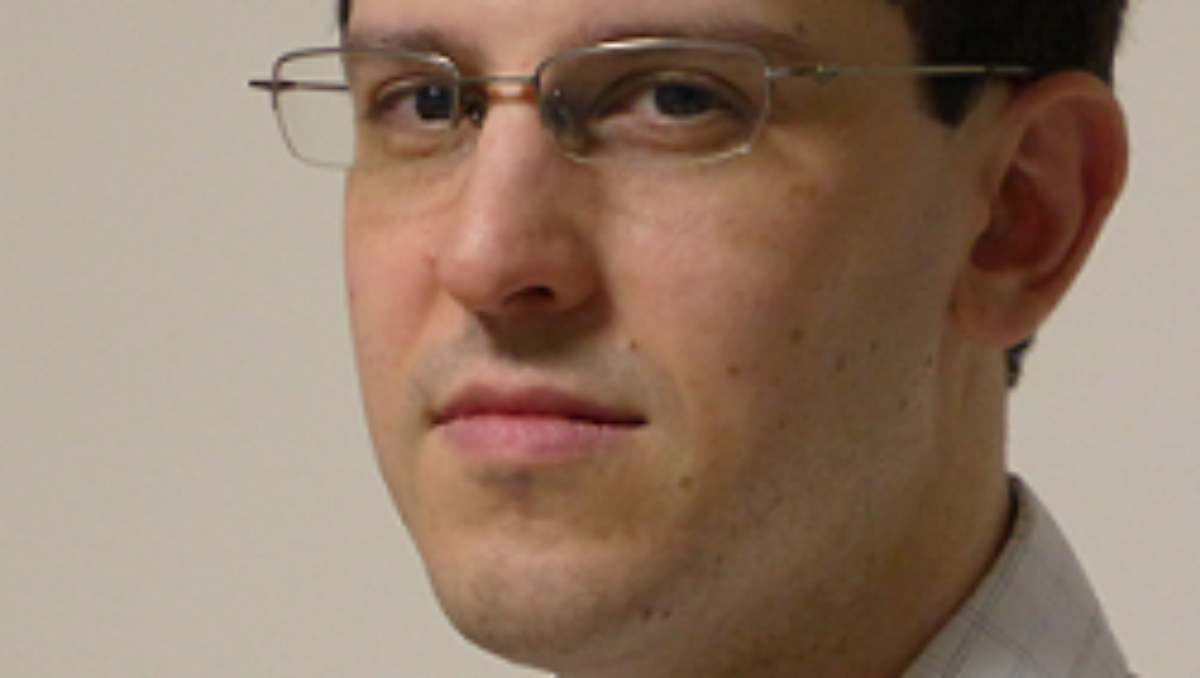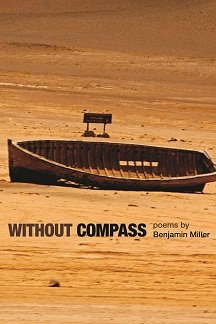Between the Lines: An Interview with Benjamin Miller
In this installment of “Between the Lines,” Dustin Pearson talks with Benjamin Miller about journeys through the desert, words as objects, and poetic self-interrogation.

DP: A lot of the poems in your collection share the same titles. The title in common I found most central was “Desert.” Between the appearance of the first “Desert” and the last, the speaker seems occupied with the idea of having done or doing nothing. My mind immediately associates those poems with Moses’ liberation of the Israelites from Egypt, but I struggle to draw an explicit connection considering the different circumstances by which the two journeys are provoked. How do you imagine the connection, if any?
BM: I did put that title there with a biblical text in mind, but it was Abraham I was thinking of, not Moses. Or, at least, Abraham most of all. He’s told by God, not once but twice (Genesis 12:1, 22:2) to get up, go, find himself, don’t worry about where, God will show you. And that idea of journeying without knowing where you’re going is what appealed to me, the being drawn forward, but where are you the whole time? You’re in this desert, this vast and isolated space. And you don’t know if you’re close or far, or if in fact you’ve traveled any great distance at all, because the light plays tricks.
Now, I know the poems themselves don’t enact that exactly: there are trees and windows and clocks and doorlocks and couches and things.
Part of it, I confess, is that this title came late to this series of poems. Originally these were days of the week, starting I think with a Wednesday, which generated the wolves who chase the sun. But another part is just a function of how I compose, which often involves taking words or objects (or words as objects) and playing with them — subsetting them, rearranging letters, thinking of their opposites and apposites — and trying to get them to yield up some insight or emotional understanding I hadn’t had before. So the couches and the bathroom door cracks and the days started out as real, but they took me to that lonely place where I could see the lines being part of this series of poems, even if the narrative of the text itself isn’t set in the desert.
DP: Your collection seems to be sensitive to the coming of night and morning, the idea of home, and especially return and arrival. I most readily think of your poem “Field Glass (Manifest)” as a good example of all these themes working simultaneously. Can you comment on what inspired this? How conscious or unconscious are their recurrence? Did that element of consciousness change over time?
BM: It did become more conscious over time. The poem you mention was written in more or less one quick outpouring, though it did get a lot cut out of it afterward, and some minor revisions made. (Other poems have had a much more belabored history.) So that wasn’t a deliberate attempt to include these themes; it just was the headspace or wordspace I was in at the time. But in my MFA thesis workshop, we were put on “word watches” by Lucie Brock-Broido; I think I also had wings and lightning and dark, which I was happy to cut back on because I didn’t want the whole book to be too, too, well, for lack of a better word, emo. But I think it was around then, seeing the consistent presence of departure, travel, sand, light, that I began to think of the book as cohering around the Abrahamic journeys I mentioned earlier, and to look for more ways to build those up: more deserts, more field glasses, more sand.
DP: The interviews in your collection are among the most fascinating and difficult poems. Can you comment on how you imagine your readers accessing these poems?
BM: Though you might not know it to look at the pages, much of the book was written under the star of W.S. Merwin’s The Lice and The Moving Target; his “Noah’s Raven” was one of the first poems I remember learning by heart, and its spirit floats over the waters of my deserts. These interviews bear clear traces of Merwin’s “Some Last Questions,” which I’ll quote a little of if I’m allowed:
What is the head
A. Ash
What are the eyes
A. The wells have fallen in and have
Inhabitants
What are the feet
A. Thumbs left after the auction
No what are the feet
A. Under them the impossible road is moving
Down which the broken necked mice push
Balls of blood with their noses
and so on. As in other cases, what I think we’re both doing is trying to re-see the significance of something right in front of us, whether it’s parts of the body or parts of words. It’s a self-interrogation, a self-spurring onward beyond the first impression. When I write,
What is the sun?
A single star does not define an evening.
I really am trying to answer the question, but to use the search for an answer as invitation to aphorism, so the answer can also stand apart from the question — and, of course, to generate new questions in turn.
… Does that answer the question?
DP: Yes, that’s a fantastic answer, thank you.
DP: Your poem, “Checklist for a Savior” seems as much a critique of saviors in general as a critique of saviors in a Christian or other religious context. Many of your poems juxtapose spiritual musings with common daily happenings. There are multiple individuals that are likened to Biblical saviors. Regardless of the miraculous tasks included, do you imagine your speaker’s checklist as an appeal to any one savior or is the checklist more symbolic?
BM: Thanks for this question: I do think the intimation of the spiritual within the everyday is part of what I wanted here, throughout the book, not least because I felt a debt to some of the people who recommended me for graduate school: I applied at the same time to MFA programs and to rabbinical school, and had the same recommenders for both, which led to some interesting conversations, to be sure, but also a conviction that to walk through the world in search of a poem is in some ways to search for the numinous. That was one idea, anyway, and somehow I ended up with swans, so go figure.
This poem is not addressed to Jesus, if that’s what you mean, and in my own Jewish context the coming of the Messiah ushers in “ha’olam haba,” which I take to mean “the eternally approaching” (rather than the usual translation, “the world to come”). So in my head, the savior isn’t someone who actually does arrive. To use the terms of your question, then, this isn’t addressed to anyone in particular.
At the same time, I don’t think symbolic is quite right, either, at least in the sense of signs referring to some clearly marked referent. What’s important for me is the stance — the waiting — the speaker, more than the spoken-to. If the poem had only the last two lines, maybe it would work just as well. Or maybe then I wouldn’t be able to say them.
__________
Benjamin Miller has studied at Harvard, Columbia, and the CUNY Graduate Center, and has taught writing at Columbia and Hunter College. His poems have appeared in RHINO, Pleiades, The Greensboro Review, and elsewhere; Without Compass is his first book. For more about Ben, visit majoringinmeta.net.
Dustin Pearson is an MFA candidate at Arizona State University. He received his BA and MA in English Literature from Clemson University. He would eat white rice and soysauce regardless of living on a graduate student budget. He is from Summerville, South Carolina, and would love to direct your literary festival. He can be reached at Dustin.Pearson@asu.edu.
Read
Three Poems by Benjamin Miller
| More InterviewsJoseph D. HaskePaul LisickyMegan StaffelCraig Morgan Teicher |
- Published in Between the Lines, home, Interview, Series
Three Poems by Benjamin Miller
IN THE PLACE OF BEST INTENTIONS
As this is not the land of ice packs
and regenerations, of spent glue guns
or antiseptic counters—since shy
reminders filter through the streets all night
(mountain streams that city fountains sip)
absconding with old disappointments—
because the powerlines are wet with flames
that spill their music into shallow halls
devoid of short-term motives, I am lost
and cannot say what may have led me here
to watch the girls unwrapping fiberboard
from miles of burlap while the waitresses
tattoo their angry daisies on my arms.
What is this place that leaves me so unmoved?
A hat I’d never worn or wanted worn
is now my prized possession; tissues packed
into abandoned zipper pockets breed—
I had forgotten that the small glass cups
were hidden in my socks and that my hands
were laced with fine red scratches
long before the advent of arrival. Now I feel
the heat of my illusion dim to tremble,
a dull intrusion into some romantic
basement of unknowable books. And so
forgive me if the water left for tea
is steeped in silt and valentines; forgive
the unexpected token undisclosed.
Last night I thought I wanted tragedy,
a chance to wick away the morning’s
donut, bagel, muffin, scorn. But to span
the gap from night to night, from night
to some hello, is more than I can yet
achieve: a phone that rings without response
and without end or empathy.
Belief is a raft tossed out on a thirsty plain.
Were I that lonesome, I’d never have left.
ON THE MARGINS OF THE PORTABLE COUNTRY
The making of ideology, of how stories learn,
ends in bone. Thus, facts without lives are trouble.
Even squall, the art of, must learn to scramble hours
as the scribblers do; and so some argument electric
in its innocence arrives to silver fictions
out of mauve and maudlin discipline.
All worthy hearts embark. But who returns
from such a journey—who could tent beneath
that zoo and cairn with time’s fool law
and still press on unscathed? (The lathe, the nick,
the cutting tree remembering the cutting.)
On the margins of the portable country,
a stranger compendium lands its craft
of pleasure and scorn, a balloon
in love with a wood, a turtle fallen
from the subjunctive into the academy.
I’ve started marking up a manual of dangers.
You have not all been selected.
IN THE WAKE OF AVOIDABLE TRAGEDY
What little remains is clear: it is over.
The first and the last having gone
and returned, come and returned,
we have learned to welcome those
who make the place feel welcoming.
A guitar in the corner hoards the light,
says: you, in a collapsing world,
your eyes such sharp, undarkened things.
From Without Compass (c) 2014 by Benjamin Miller.
Reprinted with permission of Four Way Books. All rights reserved.
“In the Wake of Avoidable Tragedy” was first published in The Greensboro Review.
- Published in Featured Poetry, home, Poetry, Series

